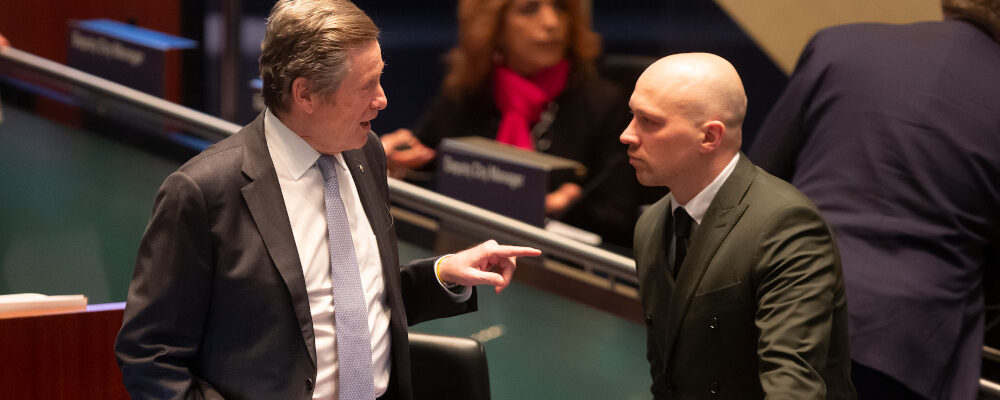We know the United States is polarized, and we bemoan the hollowing out of the “reasonable” centre. But what about Canada? We like to tell ourselves we’re not as polarized as our neighbours to the south, but our politics indicate otherwise. It can be hard to remember, because the NDP are so bad at taking credit for it, but Canada is governed by a leftist coalition that includes a socialist party, and by all accounts Liberals across Canada will continue to run and govern from the progressive Left.
Meanwhile, Canada’s Conservatives briefly flirted with running as a centrist party under Erin O’Toole, only to turn around and reject the strategy when it didn’t win them government, returning to their right-wing party comfort zone. The political centre is as vacant in Canada as it is in the U.S., leaving moderates politically homeless. But unlike in Canada, where moderate voices sound dated and irrelevant, there are signs the American intellectual centre is experiencing a burgeoning renaissance, with young energetic voices articulating a kind of radical centrism completely foreign to Canada’s milquetoast moderates.
While the party at the centre of Canada’s political spectrum might seem like the obvious milieu for thoughtful centrism to emerge, the Liberals have been so adept at holding government federally while lurching leftward that Liberals interested in a more moderate articulation of liberalism are in the witness protection program. Polite, quiet suggestions that maybe the federal government’s debt and deficits ought not to be quite so huge go unheeded and gentle questions about traditional liberal values like freedom of speech and religion go unanswered. You might think that when the Trudeau era ends, new leadership candidates will attempt to take up this vacant space on the centre-left, particularly if economic conditions necessitate it.
But there is currently an active Liberal leadership race in Ontario and while leading candidate Bonnie Crombie’s opening message—that Liberals should “govern from right of centre” seemed to want to channel exactly this instinct, it didn’t last long. Presumably, her messaging didn’t go over well since she quickly followed up with her very best entry into the Woke Olympics, calling for yet another change to Canada’s national anthem. It seems unlikely that a thoughtful centrism will emerge from within the Liberal Party any time soon.
What about Conservatives? You might think the party’s big tent and Red Tory tradition would create the conditions for a compelling, moderate approach. That’s certainly what the Centre Ice Conservatives, sorry, the Centre Ice Canadians would have us believe. As frequent readers will know, I’m not what you’d call a centrist. Regardless, I was pleased to see moderate partisan Conservatives launch the initiative, thinking the movement and Canada would benefit from a forum for exploring new policy ideas and hashing out debates on big issues.
Not so. After a couple of poorly attended, navel-gazing gatherings, the group changed its name, presumably thinking it was the word “conservative” that was hurting them. The real problem is that the group and its leaders sound as old as they look. They seem to have nothing new to say about today’s challenges and talk about the world like 25-year-olds can still buy houses and China isn’t tampering with our democracy. If Jean Charest was the Conservative’s attempt at a moderate approach, it seems unlikely that dynamic centrism will emerge from Stephen Harper’s party any time soon.
It doesn’t have to be this way. Indeed, since Donald Trump’s election first turned the U.S. political spectrum on its head, some younger, more energetic American thought leaders are experimenting with interesting versions of radical centrism. On the policy side, young wonks like Ezra Klein and Matt Yglesias are experimenting with “supply-side progressivism”, an attempt to tackle big problems like housing and green energy with market-oriented supply-side solutions, through the progressive lenses of affordability and climate change. And in the world of podcasts and books, centrist figures like Scott Galloway (AKA Prof G) and Richard Reeves are taking up pressing cultural challenges even when they’re politically incorrect—like questions of modern masculinity—with clearly moderate prescriptions.
There are even indications this approach is trickling into mainstream politics. New York City Mayor Eric Adams is a Democrat who’s brought his law-and-order policing background and common-sense ethos to fixing some of the problems that plague the city. His campaign and subsequent governing style are labour-union friendly and comfortable with municipal spending but reject the progressive urban policies that have driven lawlessness and chaos in west coast cities. What these largely unconnected figures have in common is that while their ideas are relevant, they speak to current, pressing issues and thus resonate. They are not easily identifiable as Right or Left and you can easily imagine Democrats or Republicans championing them. What thinkers or ideas match that description in Canada?

There are some glimmers of hope it’s possible here. The Hub’s own Sean Speer and the Public Policy Forum’s Ed Greenspon have channelled some of Klein, Smith, and Yglesias’ energy into a Canada-centered supply-side economic vision. Municipally, following years of old, boring centrism at the City of Toronto’s helm, a younger mayoral candidate, Brad Bradford is trying to chart a more dynamic centrist vision combining cultural progressivism and YIMBYism with the fiscally prudent commitment to open tendering that would save the city millions of dollars in construction costs.
For the most part, though, Canadian moderates and centrists lazily recycle old ideas and old language all the while complaining about how polarized our politics are. There’s nothing inherently wrong with two competing worldviews dominating the political landscape. Indeed, it’s usually from strong and clearly defined ideological frameworks that successful political projects emerge. But with today’s Liberals seized with owning Canada’s Left and Conservatives remembering how to be conservative again, there’s no question our discourse would benefit from more bold thinking in the middle.
Many Canadians are not ideologues, many consider themselves moderate, and no one has a monopoly on good ideas to address our public policy challenges. It would be nice if our political centre had something meaningful to say to them.




